

Robin
I teach Adult Basic Education at Southwest Wisconsin Technical College. I work with GED and HSED students, English language learners, and adult students wanting computer literacy skills and employability skills and a myriad of other students! I love giving people another chance at seeing their educations goals fulfilled in an alternate environment to traditional brick and mortar schools.
Standards for Students. Wisconsin Standards for Information and Technology Literacy (2017) Wisconsin defines Information and Technology Literacy as “the ability of an individual, working independently or with others, to use tools, resources, processes, and systems responsible to access and evaluate information in any medium, and to use that information to solve problems, communicate clearly, make informed decisions, and construct new knowledge, products, or systems.”
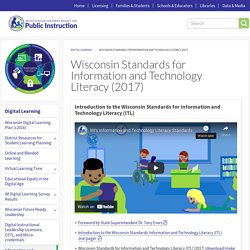
The Wisconsin Academic standards for Information and Technology Literacy are an important foundation to prepare students to be college and career ready. A Vision for Information and Technology Literacy Today’s society is witnessing an unprecedented explosion of information and use of digital resources. Youtube. Find your inspiration. Simple Video Creation Software. Create Infographics, Presentations & Reports Online. Introduction to Bubbl.us. Watch, share and upload your high quality videos. Empower Every Voice. Free Online Textbooks, Flashcards, Adaptive Practice, Real World Examples, Simulations.
10 Awesome New Web Tools for Teachers. As is usual here in Educational Technology and Mobile Learning, every two weeks, I share with you here a list of the most recently released web tools that might probably have some educational potential for your teaching and learning contexts.
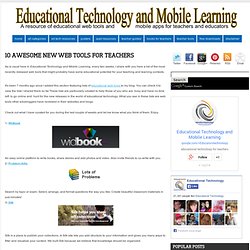
It's been 7 months ago since I added this section featuring lists of educational web tools to my blog. You can check it to view the lists I shared there so far.These lists are particularly created to help those of you who are busy and have no time left to go online and hunt for the new releases in the world of educational technology. What you see in these lists are web tools other edubloggers have reviewed in their websites and blogs. Check out what I have curated for you during the last couple of weeks and let me know what you think of them.
Enjoy. 50 Education Technology Tools Every Teacher Should Know About. Steve is in the back, uploading your file We're sorry, but we could not find what you are looking for.

Global Digital Citizen Foundation © 2015|terms & conditions|privacy policy. Web Tools to Use with Bloom's Digital Taxonomy. Training. Digital Literacy Worksheets & Teaching Resources. OER Commons. Basic Digital Literacy Skills for Adults - Applied Digital Skills. Step-by-Step Guide for Beginners (2021) Digital Learning Plan (c2016) Digital Literacy Resources LB Jan 30. How to Start a Blog in 2021: 5 Simple Steps - WebsiteSetup. Almost 80% of internet users read and interact with blogs.
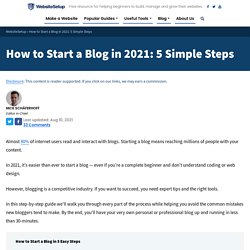
Starting a blog means reaching millions of people with your content. In 2021, it’s easier than ever to start a blog — even if you’re a complete beginner and don’t understand coding or web design. How to Create a YouTube Channel. Free Technology Tutorials at GCFGlobal. Steve's PC Tutorials. Innovative Digital Learning - EdTech Center @ World Education. By Alison Ascher Webber This week I facilitated an all-star panel organized by the Migration Policy Institute to showcase innovative program models that leverage educational technologies to train hard-to-reach adults and extend learning beyond classroom walls.
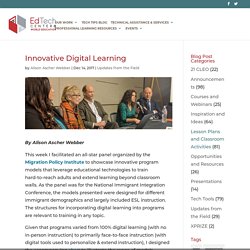
As the panel was for the National Immigrant Integration Conference, the models presented were designed for different immigrant demographics and largely included ESL instruction. The structures for incorporating digital learning into programs are relevant to training in any topic. Edx. Resources for Engaging Parents and Families. Computer Tutorials and Lessons for Beginners. DigitalLearn. Digital Citizenship Curriculum.
7 Easy Ways to Get Families on Board with Digital Citizenship. Make digital citizenship a priority at school and at home.
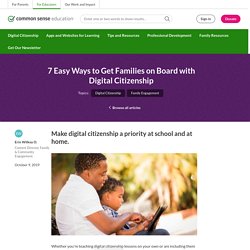
Whether you're teaching digital citizenship lessons on your own or are including them as part of a district-wide program, getting families involved and on board is essential. We know student learning is strengthened when families and educators are on the same page. Families can reinforce the lessons through conversations and expectations at home. And teachers can help students navigate the digital dilemmas they face in and out of school. What Will It Take to Close the Adult Digital Literacy Gap? As new technology continues to emerge and evolve, the need for digital literacy in the American workforce becomes increasingly important.
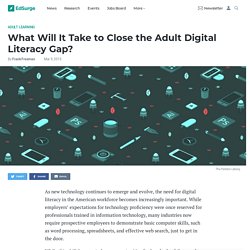
While employers’ expectations for technology proficiency were once reserved for professionals trained in information technology, many industries now require prospective employees to demonstrate basic computer skills, such as word processing, spreadsheets, and effective web search, just to get in the door. While this shift has created new opportunities for hundreds of thousands of workers, those who lack sufficient training and experience in these areas are overlooked. Almost eight in ten middle-skill jobs, which are defined as those that require less than a college degree but more than a high school degree, now require basic digital literacy skills. These jobs represent 39% of the overall U.S. job market, and can often serve as a vehicle for upward economic mobility. US Digital Literacy. Seven Elements of Digital Literacy for Adult Learners - EdTech Center @ World Education. By Jamie Harris, Adult Education Program Specialist at the Maryland Department of Labor There are terms we often hear, buzzwords, that are used everywhere, and we know those words are of importance.
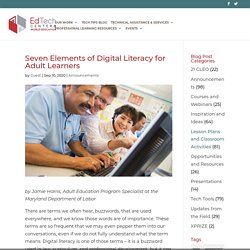
These terms are so frequent that we may even pepper them into our conversations, even if we do not fully understand what the term means. Digital literacy is one of those terms – it is a buzzword used in law, curriculum, and professional development, but it can be evasive in meaning. Does it only mean one’s ability to work with all things digital at a basic level? Does it only mean focusing on a user’s proficiency in using digital applications such as word processors and spreadsheets?
7 Characteristics Of A Digitally Competent Teacher. 7 Characteristics Of A Digitally Competent Teacher by TeachThought Staff We’ve mused in the past on the kinds of things teachers might be expected to do with technology in the classroom, what they should be able to do with an iPad (assuming they have iPads), We’ve talked about the elements of a digital classroom, ways to share large files, and store and share files on the iPad as well.
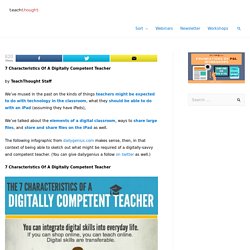
Teaching Skills That Matter in Adult Education. The Teaching the Skills That Matter in Adult Education project (TSTM) trains teachers to integrate the skills that matter to adult students using approaches that work across critical topics.
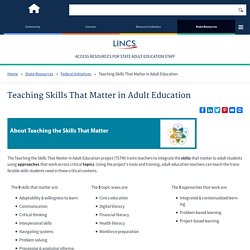
Using the project's tools and training, adult education teachers can teach the transferable skills students need in these critical contexts. NEW PROJECT ANNOUNCEMENT Applications are now available for TSTM Cohort 4 Training If you are an adult education basic skills teacher (ESL, ABE, or ASE) interested in participating in the training, please reach out to your state director and ask them to apply to have your state join us. Applications are available now through September 27, 2021. The 9 skills that matter are: Digital Literacy Initiatives. The U. S. Department of Education, Office of Career, Technical, and Adult Education (OCTAE), Division of Adult Education and Literacy (DAEL) funds digital literacy initiatives to enable adult learners to succeed in a range of academic activities, including STEM and college and career readiness. These initiatives enhance the integration of technology into instruction, increase student access to technology and leverage learning outside the classroom.
Resources for Students. Family Digital Literacy Project: using digital technologies to support literacy of parents and children - Nala. NALA has partnered with Trinity College Dublin on this project. Research Project Goal The family is a key site of literacy learning. The single biggest influence on a child’s development during their early years is the role of their parents. Family literacy is the phrase used to encompass the many activities in the home that develop literacy learning as well as educational programmes to support these. How to Teach Digital Literacy Skills. Digital literacy skills are some of the most crucial skills taught in today's schools. But knowing digital literacy skills are important to teach is far different from knowing how to teach them. As a career readiness curriculum developer, middle and high school teachers often ask us for tips on teaching digital literacy skills. How to Assess Digital Literacy for Students (and Educators!) For years, educators have been buzzing about the importance of “digital literacy.”
But what do those words really mean? According to the American Library Association, digital literacy is “the ability to use information and communication technologies to find, evaluate, create, and communicate information, requiring both cognitive and technical skills.” A growing reliance on web-based testing has forced many schools to confront the lack of digital literacy among their students and staff. And, as the COVID-19 outbreak showed us, assessing digital literacy is more important than ever—for students and for educators. What Students Need to Know. Why Media Literacy is Not Just for Kids. And that's just half the challenge. To participate fully as citizens, we need to be able to not just consume media messages but also create and share them.
"To fulfill the promise of digital citizenship, Americans must acquire multimedia communication skills and know how to use these skills to engage in the civic life of their communities," she writes. 27 Tips For Becoming A Digital Teacher. How Teachers Use Technology: The Latest Research. Learner Variability Project. How to Support Digital Literacy in Adult Learners. How can we use Connected Learning principles to promote 21st century learning? : KQED Education. The 7 Characteristics of Teachers Who Use Technology Effectively. Blog.edmentum.